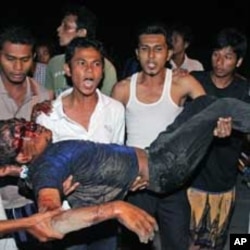Thailand has announced a plan to financially compensate victims of state security in its deep south, where a simmering insurgency has left thousands of people dead.
Rights groups have welcomed the plan as a positive step towards reconciliation but say the region still lacks much needed justice and accountability.
A committee appointed by the Thai government approved pay-outs of up to a quarter of a million dollars each for people affected by violence in the deep south. They include relatives of those killed by state security in incidents that analysts say helped fuel an insurgency that has claimed more than 5,000 lives since 2004.
Among the families to be compensated are relatives of those killed in 2004, when security forces crushed a group of Muslim militants seeking refuge at Pattani Province’s Krue Se mosque.
A few months later, 78 anti-government demonstrators died of suffocation after they were arrested and packed into trucks. Under the new plan, their relatives would be compensated.
Family of missing relatives believed to have been “disappeared” by security forces would also be compensated.
According to Sunai Phasuk, a researcher on Thailand for New York-based Human Rights Watch, the group has documented 39 cases of forced disappearance. Although the damages for southern victims is the highest ever offered and is significant in its recognition of victims of state security, Phasuk said, it does not go far enough.
“More important than compensation, there need to be investigations," he said. "There needs to be accountability. And, we hope that this [is] a very important first step that will lead to broader investigation into state-sponsored violence in the south, which has been going on for many, many years.”
The settlement for the southern victims follows a similar deal in January to compensate victims of the country’s political violence that has sporadically gripped Bangkok since 2005. Analysts say that compensation plan put pressure on the government to address the long-running grievances in the south.
A separate committee is later expected to determine compensation for relatives of security officials killed in the southern incidents.
Benjamin Zawacki, from Amnesty International in Thailand, said the conflict in the south is Thailand’s most egregious human rights problem.
“Not a single official has been held accountable for human rights violations in the deep south during that time, despite the fact that roughly 50 percent of the insurgents that have been prosecuted have been convicted," Zawacki said. "And, so there's definitely a justice deficit in the south.”
Just hours from Thailand’s famous tourist beaches, the insurgency remains concentrated in its three most southern provinces: Narathiwat, Pattani, and Yala.
Southern Thailand was an independent Malay Muslim sultanate before the Buddhist kingdom seized the region a century ago.
Ethnic Malay Muslims not happy under Thai Buddhist rule have since fought an on-and-off insurgency believed aimed at some form of autonomy. But the insurgents’ objectives remain murky as they have no public face and no clearly stated goals. They target Thai soldiers and police, but also kill hundreds of soft targets such at teachers, monks, and farmers, seen as representing the Thai Buddhist state.
Rights groups say that shadowy group security forces have resorted to torture and arbitrary detention.





